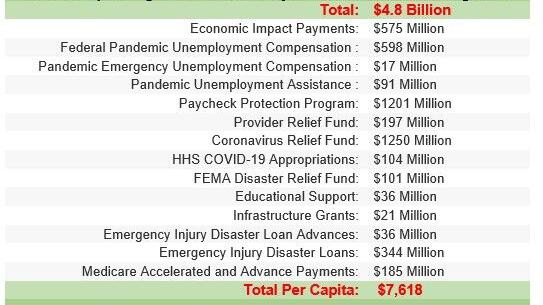The 75 million dollar question stands before the Legislature’s Joint Fiscal Committee: Shall it approve that sum for business relief grants out of unspent federal coronavirus relief funds, or return it to the Scott Administration with a request that it reapply the funds elsewhere?
The panel, made up of key members of the state House and Senate’s financial committees, meets virtually at 10 a.m. tomorrow in a Saturday session, made necessary by a short timeline and schedule conflicts.
At stake is an expansion of the economic recovery grant program, approved by the legislature and funded with part of the $1.25 billion in federal CARES Act funds reallocated from other programs that didn’t spend the money. The relief dollars would be used to help businesses make up for revenues lost due to the COVID-19 pandemic.
It’s the lion’s share of $81.7 million in remaining funds awaiting reallocation. They need to be spent by Dec. 30, or they revert back to the federal government.
State Sen. Dick Sears, D-Bennington, is among those supporting use of the funds to help the hard-hit hospitality industry, one of Southern Vermont’s largest employers before the pandemic struck.
“I will continue to advocate for the full $75 million with a priority to the hospitality sector and the arts [institutions]…. that have been hard hit and will continue to be hard hit especially given the new COVID-19 orders,” Sears said Thursday. “I have had conversations with others on the committee. I’m hopeful a majority will agree with me.”
But there are potential complications:
• As of Monday, the committee had yet to hear from health care stakeholders. $81 million of the remaining funds are being reallocated from a health care stabilization program, and committee members want to know if hospitals and medical practices are comfortable with that change.
• In a memo to the committee, Tom Kavet, the legislature’s chief economist, suggested that remaining CARES Act funds would be best spent on the social safety net, such as food banks, emergency shelters, mortgage and rent assistance, healthcare, and extended unemployment benefits.
“Although some of these have been funded in whole or part previously, these needs should come first and have sufficient capacity to withstand a second wave of the pandemic with minimal further federal assistance, and possible longer-term delays in the widespread availability of a vaccine,” Kavet wrote. “Although funding for some of these programs may seem adequate now, the path of this pandemic is is still highly uncertain and it would be hard to have excessive capacity in many of these areas.”
That resonated with some members of the committee, including Rep. Mary Hooper, D-Montpelier, who said the funds should be spent on the most vulnerable Vermonters as winter closes in.
Others, including state Sen. Jane Kitchel, D-Caledonia, questioned whether the methodology used by the Agency of Commerce and Community Development — assessing lost revenue rather than profitability — is the most effective way to determine which businesses should receive grants.
While Kavet and the nonpartisan Legislative Joint Fiscal Office acknowledge the importance of acting quickly, “alternative measures of need might better target struggling businesses,” he said. “This methodology and its focus on revenue loss make it difficult to strategically target state dollars where they are needed most within the business community.”
But Economic Development Secretary Joan Goldstein told the committee the agency settled upon revenue loss as the most equitable measuring stick for the task.
The Vermont Chamber of Commerce is in favor of the relief package, Betsy Bishop, the chamber’s executive director, said Thursday. She said the organization has made its case to Gov. Phil Scott, and to members of the Joint Fiscal Committee.
“The unmet need for these businesses is vast, and the applications far exceed the funds available. It is important to build a bridge for these businesses to power through this pandemic because these businesses fuel our economy and will be the key to the state’s economic recovery,” Bishop said. “They will use the funds to keep people employed, pay their leases and mortgages and stay open at less than full capacity. If we value our communities, we need to ensure our businesses survive so that there will be an economic engine in the future.”
One thing the panel must do Saturday is decide. The terms approved by the legislature as part of the fiscal 2021 budget stipulate that once the administration brings forward a reallocation proposal, the committee has 10 days to vote those proposals up or down.











